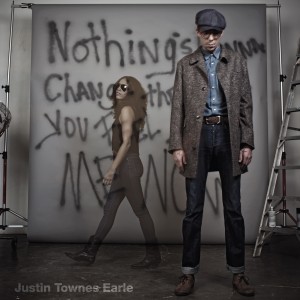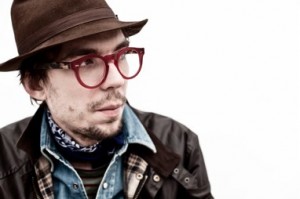Exclusive Q and A: Justin Townes Earle Comes Clean about Rehab, Music, and His Future
posted in: Country • Exclusive Interviews
 Justin Townes Earle, the son of much-loved music icon Steve Earle, may be Nashville royalty, but you’d never know it by talking to him.
Justin Townes Earle, the son of much-loved music icon Steve Earle, may be Nashville royalty, but you’d never know it by talking to him.
Even after winning all kinds of critical and popular kudos for his 2010 album Harlem River Blues, the now thirty-year-old Earle stayed focused on his music and moving his career forward. He’s done just that on Nothing Gonna Change the Way You Feel About Me Now, an Americana feast filled with blues and soul. As lush as the music is, it’s the personal stories told in the songs”about his father, loneliness and longing”that grab at the listeners’ heart strings.
Just before he began his spring tour behind the just-released album, Earle spoke to OurStage about his music, his life and just what he hopes to find moving ahead.
OS: You had amazing success with Harlem River Blues, winning all kinds of awards including the Americana Music Association Award for Song of the Year for the title track. Now you’re again nominated for Americana Music Association Awards for your latest album Nothing Gonna Change the Way You Feel About Me Now. That’s great, but why did you decide to turn around and release another album so quickly?
JTE: I just didn’t see that after Harlem River Blues it was any time to rest on my laurels. It did a lot of things (including winning popular acclaim and media attention) that my other records didn’t do. In this environment, in this industry, it definitely takes extreme hard work and extreme luck to make it these days. Also, I keep writing and getting ideas for records.
 OS: The big question is, how do you write? Do you sit down in a very deliberate way or jot notes at various times?
OS: The big question is, how do you write? Do you sit down in a very deliberate way or jot notes at various times?
JTE: I have always been a cocktail napkin kind of writer. I’ve never been a sit down writer. That just makes me frustrated. I am not a novelist; I don’t write a lot of words. Songs are condensed versions of [stories]. It’s a slow process.
OS: So do you build songs from past notes?
JTE: I revisit things a lot. I always keep the old notepads around for every year, every record I write. I always start a few songs that I don’t finished. Still, I don’t write more than about ten to twelve songs a year so I have enough for an album. I don’t see why anyone would.
OS: I can never believe how forthcoming you are about your personal struggles. And you certainly mention those battles in the new songs. What prompts you to write about such personal issues?
JTE: Well I turned thirty and it just reflects for me a kind of a vulnerability. I spent a lot of time in my mid 20s feeling kind of bullet proof. Now I’ve realized my own mortality and I’m clearer on what I need to finish and what I don’t. My filter is really a little wider than most people’s; I write about what I know, and I know more and more every year.
OS: But still, you’re very brave to be that forthcoming.
JTE: I’m just being honest. ˜This is me, this is what I am” kind of thing. Other people go through this too. I work on it. I don’t know what will happen. I never really had a chance at a personal life, anyway. I was raised by a single mother and in Nashville everyone knew who my father was. They were talking about me making records before I had even decided to make records.
OS: So you’ve said you recorded this album in an analog studio. Why did you choose one in Asheville, NC?
JTE: I think North Carolina is definitely a hipper part of the US. It’s just a beautiful little town. There’s sort of a North Carolina hippie redneck thing there. You can go to Asheville, which is a great town, and [close by are] the mountains of North Carolina where you can find the blues. You can jump in the car and drive up to Black Mountain and be in the middle of nowhere.

OS: And there’s a lot of Native American spirituality there too, right?
JTE: I do think you have to be careful about that. That’s not [non Native Americans’] spirituality, and it can rare up and bite you.
OS: I love the gritty sound on the album. What do you credit with that coming together so well, besides, of course, the analog recording.
JTE: I have a special person in my engineer. He has a really great understanding of old microphones and really helped the process along. I am also very careful when I write a song. When I’m done writing I have an idea of the instrumentation and what I want to do. We do a lot of work on the front end. We spent a whole day writing horn parts. It’s a process.
OS: And it’s such a long process. Now that you’ve lived with the album for a while, what do you think of it?
JTE: I love it. I am very happy with it. I’m very lucky in my career that I haven’t made a record that I hate. I have had complete, 100 percent artistic control. If I don’t like it, it’s my own fault.
OS: When your fans hear the new songs, what do you hope they take away?
JTE: I just want them to just think about the fact that this is a little bit of a revolt from Harlem River Blues and to keep that in mind. I’m a singer-songwriter; I don’t do the same thing twice. I can’t stay focused to do that, anyway. So this is a transition for me artistically and the songs are very representative of where I stand as a person, or where I stood six months ago.
Find out more about Justin Townes Earle, including his upcoming tour dates, on his website.
